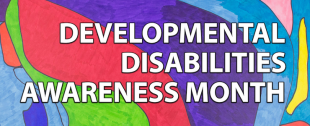What are developmental disabilities?
Developmental disabilities refer to a group of conditions. These are due to an impairment in one of four areas: physical, learning, language or behaviour. These conditions begin during a child’s developmental period, and typically before a person is 22 years old. They usually last throughout a person’s lifetime, and may impact daily life.
Developmental disabilities are described as a severe and chronic disability. They result in substantial functional limitations in three or more areas of major life activity:
- self-care
- receptive and expressive language
- learning
- mobility
- self-direction
- independent living
- economic self-sufficiency
Diagnosed conditions include, but are not limited to, some severe autism spectrum conditions, Down’s syndrome, cerebral palsy, spina bifida, severe hearing loss, and visual impairments. Some might be diagnosed at birth, whereas others might not be discovered until the child is old enough to walk or talk.
Some conditions are associated with having a learning disability because people with these conditions are more likely to have one. For example, everyone with Down’s syndrome has a learning disability, and so do many people with cerebral palsy. Around 30% of people with epilepsy also have a learning disability. Children with a learning disability may also have special educational needs (SEN).

Developmental milestones
Developmental milestones are used to track a child’s development as they age. They include, but are not limited to:
- learning to crawl
- taking a first step
- smiling for the first time
- saying your first word
Milestones are an age range when we might expect children to be able to do certain things. For example, when children learn to play, learn, speak, behave and move. Most people develop at their own pace, and it is therefore impossible to tell when in time a person will learn a specific skill. Developmental milestones exist to give an average timescale in which children are expected to learn various skills as they grow up. ‘Developmental delay’ is where children are missing these milestones.
The role of parents
Parents or legal guardians of children will know the child’s behaviour best. It is important for them to keep an eye on how the child develops, and if they are reaching developmental milestones within the average timeframes.
If a child is not meeting the milestones for their age, or you believe there is a problem with how they play, learn, speak, act or move, then it is advised to speak to your General Practitioner (GP). Do this as soon as you notice any delays in the child reaching developmental milestones. Acting early can hugely benefit the child’s development.

Healthcare professionals
A good relationship between parents or guardians with a healthcare professional is helpful when supporting a child with developmental disabilities. Monitoring the child’s development, and recording any significant changes towards meeting their milestones is helpful information to share with healthcare professionals. This is called developmental monitoring.
Any issues that are flagged can be followed up with developmental screening, carried out by the healthcare provider. This is a short test that determines if the child is learning basic skills in the expected timeframe, or if there are delays. If the child has a developmental delay, it is important to seek help early on. Early intervention can have a positive impact on the child’s ability to learn new skills.
The right support from professionals can help children with a developmental disability live as full and an independent a life as possible. Support can include GPs, paediatricians, speech and language therapists, physiotherapists, educational and clinical psychologists and social care.
Daily life with a developmental disability
Daily life will look different for each family as lots of different types of disability and additional needs are covered under developmental disabilities’. Children with developmental disabilities need the same as non-disabled children – staying well, active and part of a community and leading fulfilling lives full of opportunity.
Families require the tools and information to make informed, healthy decisions to prevent illness. Some health conditions are known to be more common among children with developmental disabilities. These include asthma, eczema and skin allergies, gastrointestinal symptoms and migraines.
Do you need support to find out if your child has a developmental disability?
Have a look at mencap's resource page on developmental delays for advice and support.
You can also book an appointment with your child’s GP if you are concerned that your child is missing key developmental milestones.
Join the conversation and follow us on Twitter @DisabilityUnit to keep up-to-date with what we’re doing.
Leave a comment